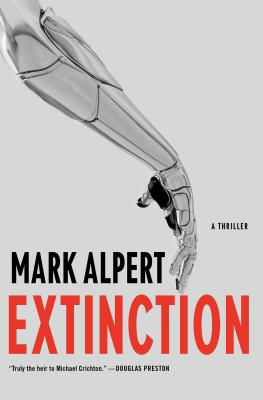by Mark Alpert
Every time a writer is compared to the late, great Michael Crichton, my heart skips a happy beat. I don’t think his large shoes will be filled any time soon, but I am delighted to see other writers trodding the same territory. Mark Alpert is a natural for these comparisons. With a degree in astrophysics and more than a decade on the editorial staff of Scientific American magazine, the man knows his science. Extinction is his third foray into the word of fiction.
After a brief prologue, readers are introduced to former soldier Jim Pierce. Himself an amputee, Jim has turned his engineering know-how to the world of high-tech prosthetics. In the novel’s opening scene, he’s having a consultation with a young soldier, explaining to the wounded man just how advanced these devices have become. The prosthetics Jim builds (and wears) are like something out of a James Bond film, and controlled wirelessly by the user’s brain—just like a natural body part.
Shortly after he leaves Jim’s workroom, an unexpected visitor arrives asking questions about Jim’s estranged, 22-year-old daughter, Layla. The visitor claims to be from the military, but that story quickly breaks down into threats and violence. Jim is more than an ex-soldier, he’s a former intelligence officer, and he knows a Chinese spook when he sees one. What the hell has his daughter gotten herself into?
Alpert’s tale is not a simple high-concept plot that can be summarized in a few sentences or even paragraphs. I suspect I should quit this synopsis while I’m ahead. Extinction deals with a variety of technologies involving machine-brain interfaces. Some are as innocuous as bionic limbs and eye glasses that function as eyes for the blind. Other technologies lead to the threat at the heart of this novel—a dangerous new artificial intelligence, a sort of human-machine hybrid that wants to rid the world of the vast majority of those pesky human components. It is this borg-like entity that may well pull the trigger on our extinction. And Jim Pierce and his daughter somehow get sucked into this high-stakes drama. I’ll leave it to you to uncover the details.
It is unsurprising that Mr. Alpert is at his best when delving into the science that is integral to the novel’s plot. Says one character:
“Just think of it! We won’t be tied to these fragile bodies anymore! If we can store a person’s memories in a sufficiently powerful processor, we can program it to generate new thoughts based on those memories. For all intents and purposes, the intelligence inside the processor would be identical to the one inside the person’s brain. And this will become possible very soon, within the next few decades. There are people alive today who will never die!”An author’s note at the novel’s end gives readers a better idea of what is fact and what is fiction. It’s surprisingly difficult to figure out in this day-after-tomorrow-set tale. The science in this book is smart, fascinating, and has a really high gee-whiz quotient. Alpert delves enthusiastically into several different disciplines. It’s exactly what I want to see in this type of thriller. Further, Mr. Alpert has fashioned a fun, fast plot in which to imbed all that science. Yes, it is somewhat formulaic, but aren’t they all?
Mark Alpert brings a heap of knowledge to his fiction, and he’s great at explaining complex ideas and building a plot around them. However, it’s the actual mechanics of writing fiction where he’s weakest. This is most apparent near the novel’s opening. Some of the early exposition was truly graceless. Nor will he win any awards for the elegance of his prose. It’s serviceable, but nothing more. And, yes, there were a few plot contrivances. Alpert does better with his action sequences. They really propel the narrative in the second half of the novel. Character development is a mixed bag. A description of how Layla experiences music, for example, was a great insight into how she experiences the world. It was a lovely detail.
Most readers of techno-thrillers aren’t concerned about a little clumsy exposition. Most are looking for some smart, speculative science buried in a propulsive plot. They’re looking for a glimpse of that old Crichton magic. And they just might find it in Extinction.

I feel the same way about comparisons to Michael Crichton! Clicked through from your Amazon review of this book and appreciate finding another reader with similar tastes. Thanks!
ReplyDeleteHi Elliott,
ReplyDeleteI'm so glad you tracked me down here and on Twitter. I was going to recommend Amy Rogers' excellent Science Thrillers blog to you, but I can see you've already discovered her.
Well, I read lots of this sort of thing, so we are definitely of similar tastes. I'll look forward to hearing your own opinions and recommendations. :-)